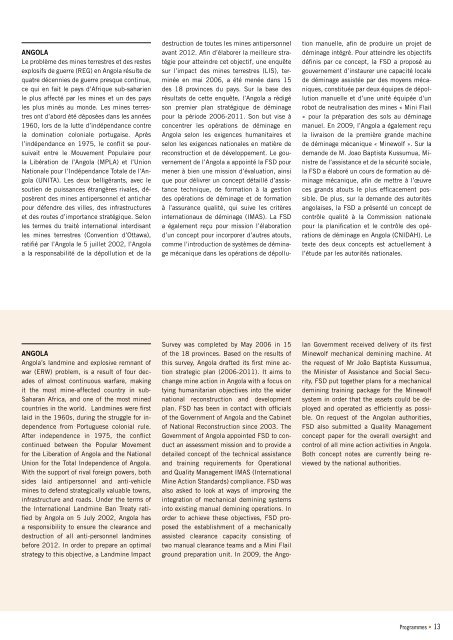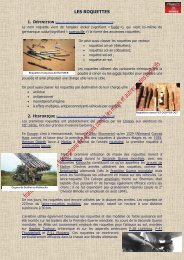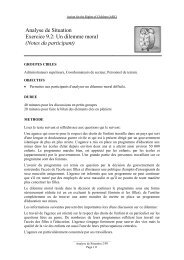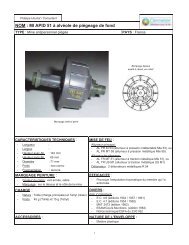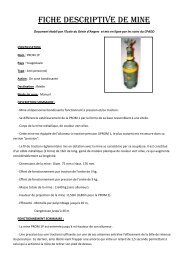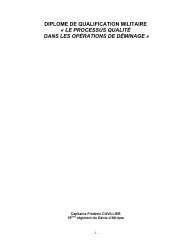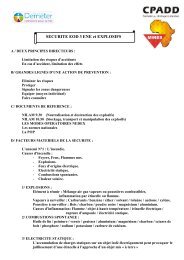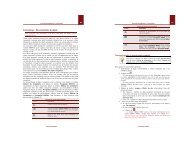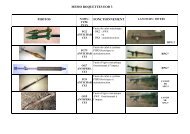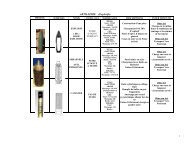RappoRt annuel annual RepoRt 2009 - BIBLIOMINES
RappoRt annuel annual RepoRt 2009 - BIBLIOMINES
RappoRt annuel annual RepoRt 2009 - BIBLIOMINES
Create successful ePaper yourself
Turn your PDF publications into a flip-book with our unique Google optimized e-Paper software.
angola<br />
le problème des mines terrestres et des restes<br />
explosifs de guerre (ReG) en angola résulte de<br />
quatre décennies de guerre presque continue,<br />
ce qui en fait le pays d’afrique sub-saharien<br />
le plus affecté par les mines et un des pays<br />
les plus minés au monde. les mines terrestres<br />
ont d’abord été déposées dans les années<br />
1960, lors de la lutte d’indépendance contre<br />
la domination coloniale portugaise. après<br />
l’indépendance en 1975, le conflit se poursuivait<br />
entre le Mouvement populaire pour<br />
la libération de l’angola (Mpla) et l’union<br />
nationale pour l’Indépendance totale de l’angola<br />
(unIta). les deux belligérants, avec le<br />
soutien de puissances étrangères rivales, déposèrent<br />
des mines antipersonnel et antichar<br />
pour défendre des villes, des infrastructures<br />
et des routes d’importance stratégique. Selon<br />
les termes du traité international interdisant<br />
les mines terrestres (Convention d’ottawa),<br />
ratifié par l’Angola le 5 juillet 2002, l’Angola<br />
a la responsabilité de la dépollution et de la<br />
angola<br />
angola’s landmine and explosive remnant of<br />
war (eRW) problem, is a result of four decades<br />
of almost continuous warfare, making<br />
it the most mine-affected country in sub-<br />
Saharan africa, and one of the most mined<br />
countries in the world. Landmines were first<br />
laid in the 1960s, during the struggle for independence<br />
from portuguese colonial rule.<br />
After independence in 1975, the conflict<br />
continued between the popular Movement<br />
for the liberation of angola and the national<br />
union for the total Independence of angola.<br />
With the support of rival foreign powers, both<br />
sides laid antipersonnel and anti-vehicle<br />
mines to defend strategically valuable towns,<br />
infrastructure and roads. under the terms of<br />
the International landmine Ban treaty ratified<br />
by Angola on 5 July 2002, Angola has<br />
a responsibility to ensure the clearance and<br />
destruction of all anti-personnel landmines<br />
before 2012. In order to prepare an optimal<br />
strategy to this objective, a landmine Impact<br />
destruction de toutes les mines antipersonnel<br />
avant 2012. Afin d’élaborer la meilleure stratégie<br />
pour atteindre cet objectif, une enquête<br />
sur l’impact des mines terrestres (lIS), terminée<br />
en mai 2006, a été menée dans 15<br />
des 18 provinces du pays. Sur la base des<br />
résultats de cette enquête, l’angola a rédigé<br />
son premier plan stratégique de déminage<br />
pour la période 2006-2011. Son but vise à<br />
concentrer les opérations de déminage en<br />
angola selon les exigences humanitaires et<br />
selon les exigences nationales en matière de<br />
reconstruction et de développement. le gouvernement<br />
de l’angola a appointé la FSD pour<br />
mener à bien une mission d’évaluation, ainsi<br />
que pour délivrer un concept détaillé d’assistance<br />
technique, de formation à la gestion<br />
des opérations de déminage et de formation<br />
à l’assurance qualité, qui suive les critères<br />
internationaux de déminage (IMaS). la FSD<br />
a également reçu pour mission l’élaboration<br />
d’un concept pour incorporer d’autres atouts,<br />
comme l’introduction de systèmes de déminage<br />
mécanique dans les opérations de dépollu-<br />
Survey was completed by May 2006 in 15<br />
of the 18 provinces. Based on the results of<br />
this survey, Angola drafted its first mine action<br />
strategic plan (2006-2011). It aims to<br />
change mine action in angola with a focus on<br />
tying humanitarian objectives into the wider<br />
national reconstruction and development<br />
plan. FSD has been in contact with officials<br />
of the Government of angola and the Cabinet<br />
of national Reconstruction since 2003. the<br />
Government of angola appointed FSD to conduct<br />
an assessment mission and to provide a<br />
detailed concept of the technical assistance<br />
and training requirements for operational<br />
and Quality Management IMaS (International<br />
Mine action Standards) compliance. FSD was<br />
also asked to look at ways of improving the<br />
integration of mechanical demining systems<br />
into existing manual demining operations. In<br />
order to achieve these objectives, FSD proposed<br />
the establishment of a mechanically<br />
assisted clearance capacity consisting of<br />
two manual clearance teams and a Mini Flail<br />
ground preparation unit. In <strong>2009</strong>, the ango-<br />
tion manuelle, afin de produire un projet de<br />
déminage intégré. pour atteindre les objectifs<br />
définis par ce concept, la FSD a proposé au<br />
gouvernement d’instaurer une capacité locale<br />
de déminage assistée par des moyens mécaniques,<br />
constituée par deux équipes de dépollution<br />
manuelle et d’une unité équipée d’un<br />
robot de neutralisation des mines « Mini Flail<br />
» pour la préparation des sols au déminage<br />
manuel. En <strong>2009</strong>, l’Angola a également reçu<br />
la livraison de la première grande machine<br />
de déminage mécanique « Minewolf ». Sur la<br />
demande de M. Joao Baptista Kussumua, Ministre<br />
de l’assistance et de la sécurité sociale,<br />
la FSD a élaboré un cours de formation au déminage<br />
mécanique, afin de mettre à l’œuvre<br />
ces grands atouts le plus efficacement possible.<br />
De plus, sur la demande des autorités<br />
angolaises, la FSD a présenté un concept de<br />
contrôle qualité à la Commission nationale<br />
pour la planification et le contrôle des opérations<br />
de déminage en angola (CnIDaH). le<br />
texte des deux concepts est actuellement à<br />
l’étude par les autorités nationales.<br />
lan Government received delivery of its first<br />
Minewolf mechanical demining machine. at<br />
the request of Mr João Baptista Kussumua,<br />
the Minister of assistance and Social Security,<br />
FSD put together plans for a mechanical<br />
demining training package for the Minewolf<br />
system in order that the assets could be deployed<br />
and operated as efficiently as possible.<br />
on request of the angolan authorities,<br />
FSD also submitted a Quality Management<br />
concept paper for the overall oversight and<br />
control of all mine action activities in angola.<br />
Both concept notes are currently being reviewed<br />
by the national authorities.<br />
Programmes • 13


